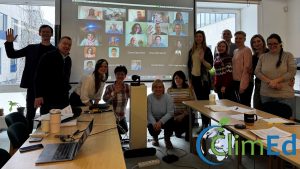Project Description

The ClimEd 6th Training on “Mastering Technologies of Massive Open Online Courses Development for General Public” took place in a hybrid mode during 10-14 February 2025. The ClimEd project trainings are focused on training the faculty/ teaching/ research staff and postgraduates at the ClimEd partner institutions and collaborating organizations in advanced educational and information-and-communication technologies for building a flexible multi-level integrated practice-based education system in the field of Climate Services, Climate Change Adaptation and Mitigation.
In total, 58 persons (including 47 females and 11 males; and 13 young teachers/researchers) were accepted to participate in this onsite/online (hybrid) training. These were from the Ukrainian ClimEd partners and other institutions such as the ONU – Odessa I.I. Mechnikov National University (Odessa, Ukraine); KNUCA – Kyiv National University of Construction and Architecture (Kyiv, Ukraine); BekNU – O. Beketov National University of Urban Economy (Kharkiv, Ukraine); LPNU – Lviv Polytechnic National University (Lviv, Ukraine); BTNAU – Bila Tserkva National Agrarian University (Bila Tserkva, Ukraine); ONMU – Odesa National Medical University (Odessa, Ukraine); NUOMA – National University Odessa Maritime Academy (Odessa, Ukraine); TSNUK – Taras Shevchenko National University of Kyiv (Kyiv, Ukraine); ICSA – Institute of Climate-Smart Agriculture NAAS (Odessa region, Ukraine), VNKNU – V. N. Karazin Kharkiv National University (Kharkiv, Ukraine).
The training started with a series of lectures. The presented lectures covered the following topics/ blocks: Block B1: Foundations of MOOC Development for the General Public (Introducing participants to the principles and processes behind designing Massive Open Online Courses (MOOCs). This block covers foundational concepts, including sustainability-focused competencies, advanced educational technologies, and practical applications for public engagement through MOOCs). Block B2: Practical Techniques and Tools for MOOC Creation (Emphasizing hands-on workshops and lectures on developing MOOCs using innovative tools such as H5P and Canva; exploring practical examples and learn to design sustainability-driven MOOCs with engaging content and materials). Block B3: Enhancing MOOC Engagement and Learning Strategies (Focusing on interactive elements such as video editing, assessment strategies, and marketing techniques to attract and retain learners; engaging in practical sessions, leveraging educational technologies to maximize course effectiveness). Block B4: Presentations and Collaborative Feedback for MOOC Success (Presenting group work, receiving critical feedback, and discussing strategies for deploying MOOCs to the public). This block concluded with completion ceremonies and reflections on applying MOOC tools and methods to enhance online education. All materials of the training (slides and videos of lectures, presentations of exercises and homework assignments as group projects, etc.) are now available at: http://climed.network/events/climed-trainings/climed-training-6
All Groups got high scores, and, respectively, have been awarded the certificates and invited participants for the ClimEd 7th Training (7-11 April 2025 as onsite/online (hybrid) training in Spain). It was stressed that the training participants had obtained a better understanding of what a MOOC is and how it differs from a traditional e-course. They can design the MOOC development process, from idea generation to course implementation; the ability to apply techniques for developing MOOCs using platforms like Moodle and Canvas; the ability to create and present learning materials and interactive content using H5P; and the ability to use assessment and feedback tools for MOOCs. At the end of the training, they presented their group work, which involved creating a micro-course for a MOOC. The training was combined with interesting social activities, which all participants enjoyed, such as an excursion to Setomaa Cultural Center and Värska Farm Museum on the last day.
The introduction to Group Work as Small-Scale Research Projects (SSRPs) to be realized as group projects was given to participants on 10 February 2025. On 12 February 2025, a series of short oral presentations about Group Project plans was delivered by each Group (named F01-F15). Each group realized that working in groups on projects is its project. The main focus for SSRPs was on developing MOOCs using innovative tools such as H5P and Canva; The main goal for each Group was to create examples of sustainability-driven MOOCs with engaging content and materials.
The e-evaluation of the ClimEd 6th Training was done using two questionnaires distributed among participants. Following the 1st questionnaire – (Evaluation of the Training) – 97% of the participants estimated overall rating for this course as” very good” and “good”; training materials were of “excellent” (90%), and “very good” (10%) quality and information about the training was sufficient (100%), and participants will recommend such training to colleagues (97%). Following the 2nd questionnaire – (Self-Evaluation of the Obtained Competencies and Skills) – about 92% of participants “fully agreed” and “mostly agreed” that they have obtained/ improved their competencies and got skills working as groups.
Special thanks to all lecturers of the training – Dr. Anna Beitane (Johan Skytte Institute of Political Studies, University of Tartu, Estonia), Drs. Rami Ratvio and Laura Riuttanen (University of Helsinki, Finland), Drs. Jon Xavier Olano Pozo, Anna Boqué-Ciurana and Prof. Enric Aguilar (Universitat Rovira i Virgili, Spain), Veljo Kabin (Estonian University of Life Sciences, Estonia) – for their professionalism, enthusiasm, and commitment to the training; and EULS team – Prof. Kalev Sepp; Dr. Volha Kasakevich, and Educational technologist Veljo Kabin – for excellent organization and warm atmosphere during the training. Thanks to the ONU team members (Drs. Valeriya Ovcharuk, Inna Khomenko, and Nataliia Bulat, and IT-manager Vladimir Andrusenko) for support with ClimEd relevant modules development; e-evaluations; continuous web-update of the training materials.
See details in a summary document & photos from the 6th training.
Text by: Valeriya Ovcharuk, Inna Khomenko, Nataliia Bulat (ONU) & Hanna Lappalinen, Alexander Mahura (UHEL-INAR)
22 February 2025
Joint online photo of the ClimEd 6th Training participants
